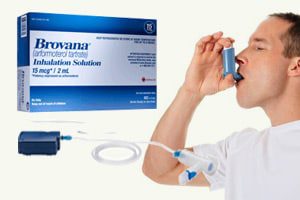
The U.S. Food and Drug Administration just wrote to Sunovian Pharmaceuticals Inc. over the way in which the drug maker promoted Brovana, its respiratory medication. In its October 24th letter, the agency stated that it found Sunovian’s marketing of Brovana to be deceptive; that the information on the drug’s risk were hidden in small print; […]
 The U.S. Food and Drug Administration just wrote to Sunovian Pharmaceuticals Inc. over the way in which the drug maker promoted Brovana, its respiratory medication.
The U.S. Food and Drug Administration just wrote to Sunovian Pharmaceuticals Inc. over the way in which the drug maker promoted Brovana, its respiratory medication.
In its October 24th letter, the agency stated that it found Sunovian’s marketing of Brovana to be deceptive; that the information on the drug’s risk were hidden in small print; and that the drug’s efficacy statements included promises and overstatements, including that Brovana would help bring patients “back to daily living,” according to Law360. Brovana is prescribed for the treatment of chronic obstructive pulmonary disease (COPD).
The agency indicated that, in clinical trials, Brovana did not bring patients “back to daily living,” but rather provided a 10 percent improvement in patient exhalation air volume during a forced breath. While an improvement, no evidence exists that Brovana’s benefits, when combined with its risks, would provide an “overall positive impact on patients’ ability to resume their baseline activities of daily living,” the FDA wrote, according to Law360.
The FDA is calling for an end to the inappropriate advertising and seeks an explanation over how Sunovian will respond, wrote Law360. Sunovian is a U.S. division of Japan based Dainippon Sumitomo Pharma Co. Ltd.
The letter is not as severe as a formal warning letter; however, the FDA did discuss a number of statements it stated created an impression that Brovana offers increased superiority compared to competitor drugs, according to Law360.
For instance, the FDA specifically discussed one Brovana pamphlet that asked, “Do you take your medicine correctly, but still feel like you may need something more?” To this, the FDA wrote: “We are not aware of any adequate and wellcontrolled headtohead studies supporting the implication that Brovana is clinically superior to other COPD therapies.”
Sunovian also asked, in another section of its brochures if patients’ hands do not move as well as in the past, which would create challenges using COPD inhalers. According to the FDA, these types of statement are misleading “because they imply that patients with compromised manual dexterity will more easily be able to administer Brovana as compared to other COPD inhaler therapies,” according to the letter.
The FDA also rebuked Sunovian for allegedly distributing marketing materials that do not mention deaths involving patients diagnosed with asthma as well as other adverse events, including chest pain and sinusitis, Law360 wrote.
Brovana’s benefits were printed in large, bolded fonts within a great deal of white space, while risks were indicated in what Law360 described as “dense blocks of small, singlespaced text,” according to the FDA letter. “The overall effect of this presentation undermines the communication of important risk information, minimizing the risks associated with Brovana,” the letter said.
According to the FDA letter, Brovana’s most common adverse reactions associated with the respiratory medication during clinical trials were pain, chest pain, back pain, diarrhea, sinusitis, leg cramps, dyspnea, rash, flu syndrome, peripheral edema, and lung disorder.


